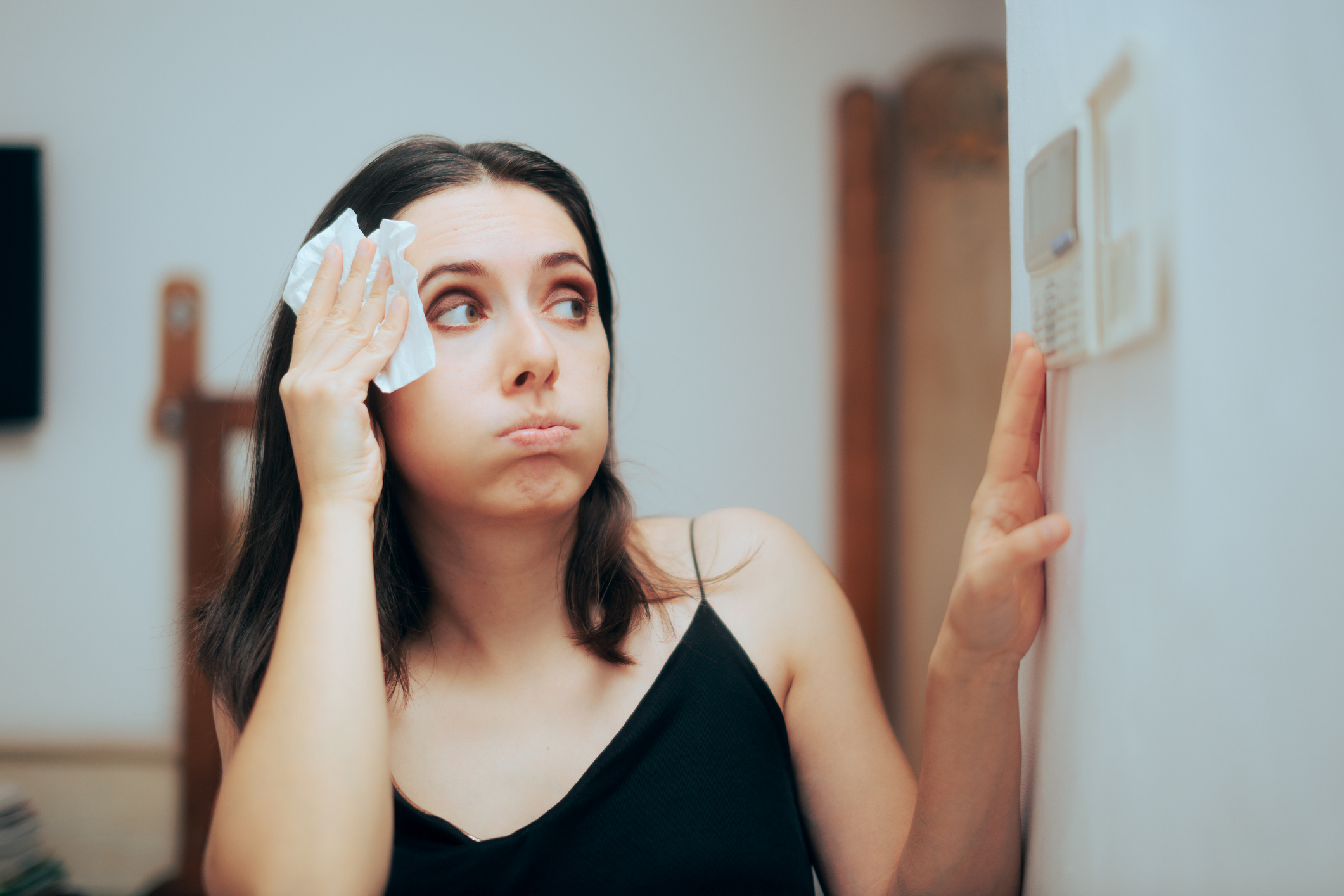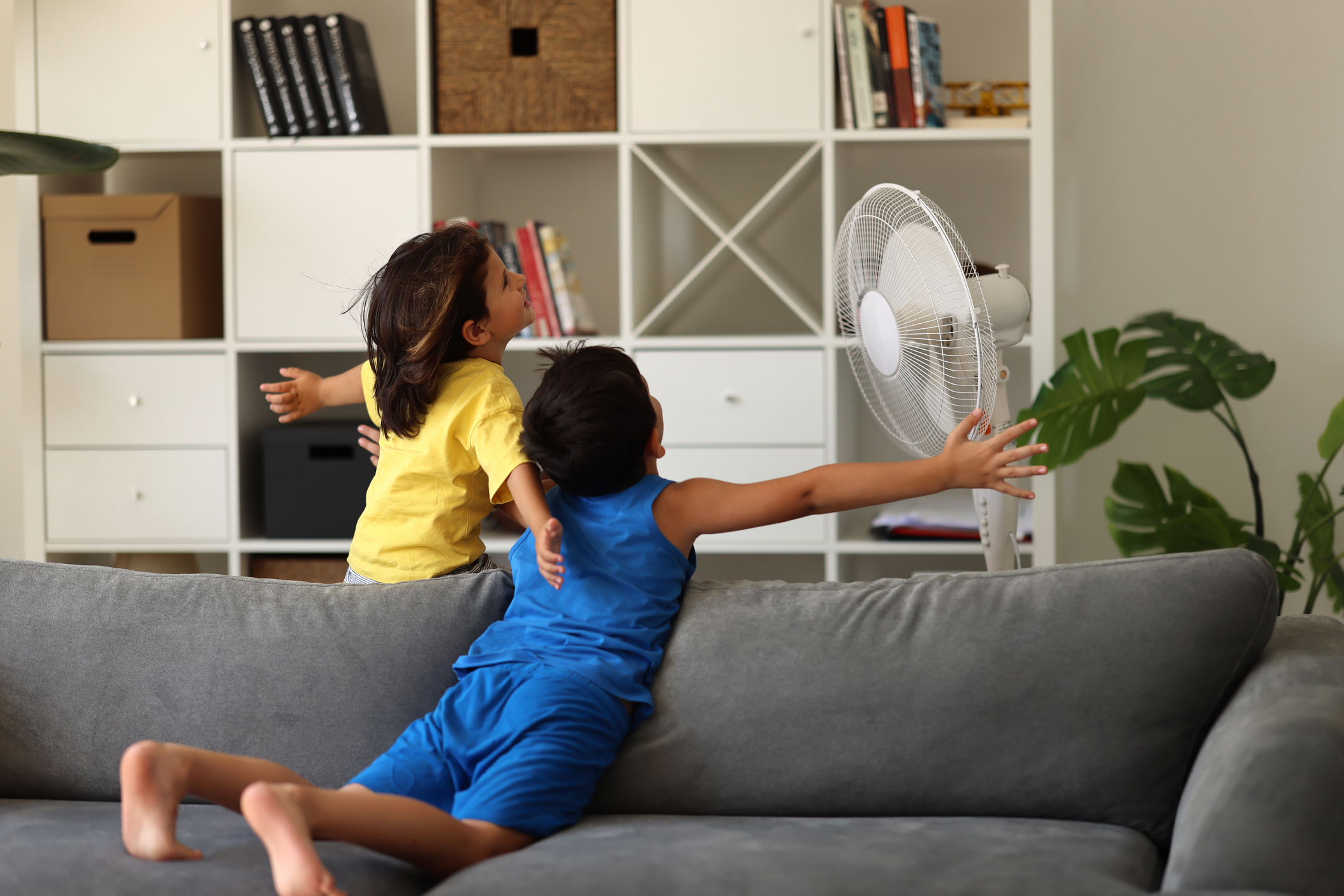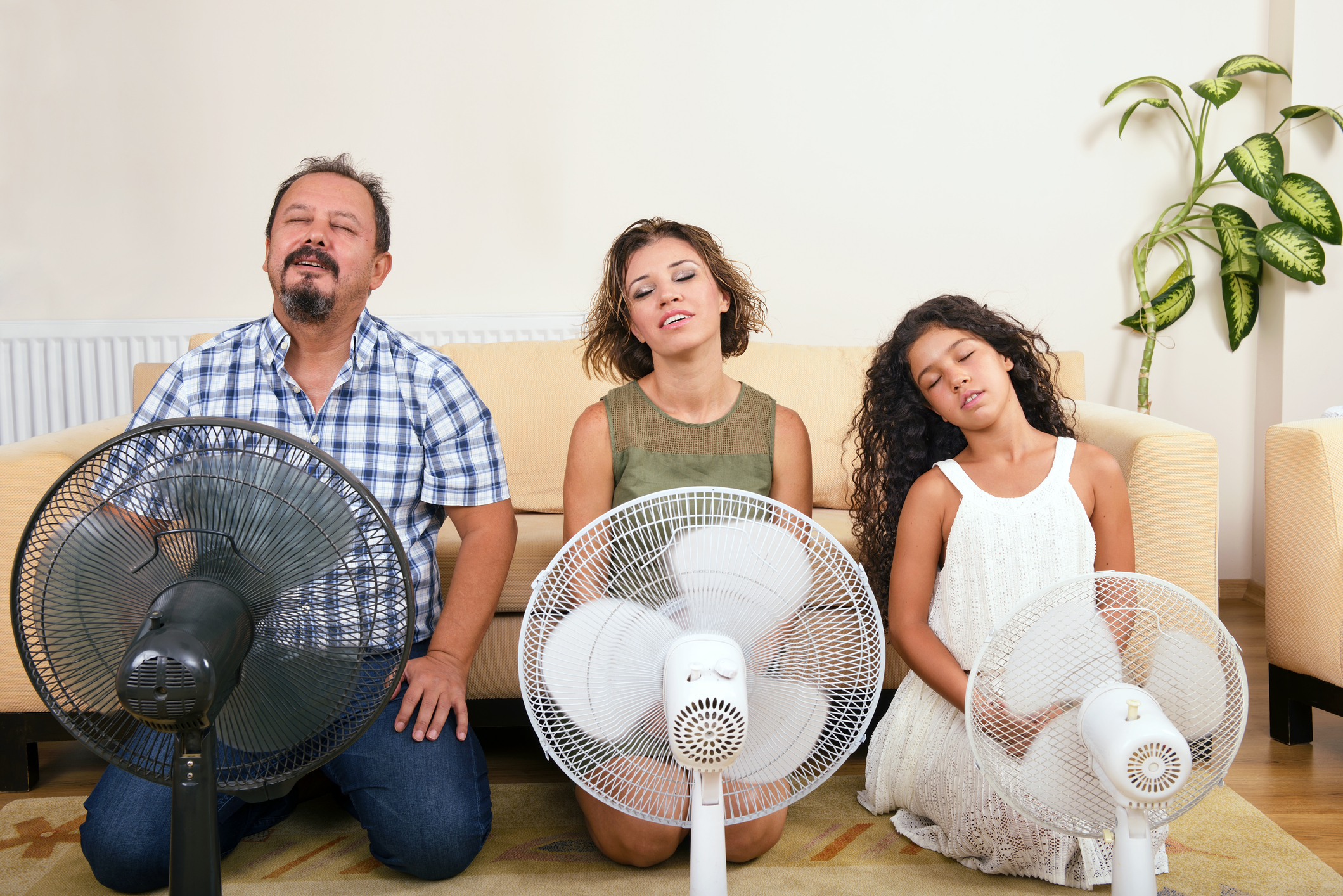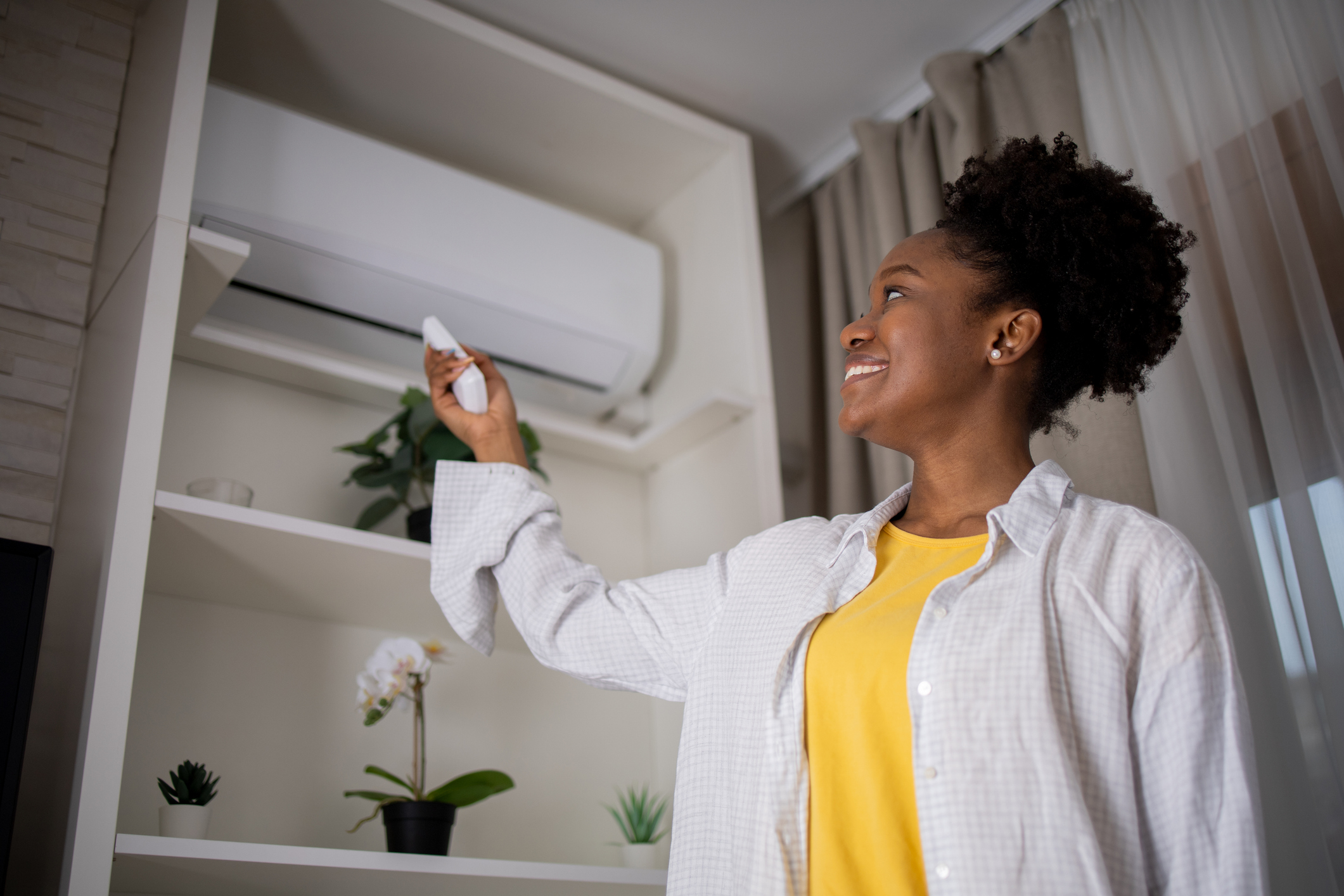Fans vs Air Conditioners: Which Is the Cheaper Way to Cool Off?
When it comes to fans vs air conditioners, what is your best bet? Fans are cheaper than air conditioners but significantly less effective when the temperature and humidity soar.


Profit and prosper with the best of Kiplinger's advice on investing, taxes, retirement, personal finance and much more. Delivered daily. Enter your email in the box and click Sign Me Up.
You are now subscribed
Your newsletter sign-up was successful
Want to add more newsletters?

Delivered daily
Kiplinger Today
Profit and prosper with the best of Kiplinger's advice on investing, taxes, retirement, personal finance and much more delivered daily. Smart money moves start here.

Sent five days a week
Kiplinger A Step Ahead
Get practical help to make better financial decisions in your everyday life, from spending to savings on top deals.

Delivered daily
Kiplinger Closing Bell
Get today's biggest financial and investing headlines delivered to your inbox every day the U.S. stock market is open.

Sent twice a week
Kiplinger Adviser Intel
Financial pros across the country share best practices and fresh tactics to preserve and grow your wealth.

Delivered weekly
Kiplinger Tax Tips
Trim your federal and state tax bills with practical tax-planning and tax-cutting strategies.

Sent twice a week
Kiplinger Retirement Tips
Your twice-a-week guide to planning and enjoying a financially secure and richly rewarding retirement

Sent bimonthly.
Kiplinger Adviser Angle
Insights for advisers, wealth managers and other financial professionals.

Sent twice a week
Kiplinger Investing Weekly
Your twice-a-week roundup of promising stocks, funds, companies and industries you should consider, ones you should avoid, and why.

Sent weekly for six weeks
Kiplinger Invest for Retirement
Your step-by-step six-part series on how to invest for retirement, from devising a successful strategy to exactly which investments to choose.
There will be little relief from soaring electricity costs or hot temperatures this summer. The Farmers' Almanac is predicting 2024 to be one of the hottest summers on record and it is expected to be a warm, hot and muggy season for most of the nation.
Staying cool will be a challenge and a necessity. Is it better to use a fan or air conditioner to beat the heat? The best answer can vary from person to person, depending on several factors. To determine which cooling solution is best for you, we first need to look at how both technologies work, when they work best and how much they cost to install and operate.
Here are some facts that can help get you through the hot summer months without dramatically increasing your energy consumption and expenses.
From just $107.88 $24.99 for Kiplinger Personal Finance
Become a smarter, better informed investor. Subscribe from just $107.88 $24.99, plus get up to 4 Special Issues

Sign up for Kiplinger’s Free Newsletters
Profit and prosper with the best of expert advice on investing, taxes, retirement, personal finance and more - straight to your e-mail.
Profit and prosper with the best of expert advice - straight to your e-mail.
Fans vs. air conditioners: how do they keep you cool?
Fans and air conditioners help you stay cool in very different ways. But both are primarily leveraging the cooling power of evaporation.
Part of what makes fans so energy efficient is they aren’t cooling down the whole room, just you. Fans blow air over your skin, which promotes moisture evaporation. Evaporation is an endothermic process, meaning the moisture absorbs heat from its surroundings as it turns into vapor. A fan helps by replacing this hot, humid air with cooler, drier air, allowing for more evaporation.
An air conditioner provides cold air inside your home by removing heat and humidity from the indoor air. It returns the cooled air to the indoor space and transfers the unwanted heat and humidity outside.
A standard air conditioner or cooling system uses a specialized chemical called refrigerant and has three main mechanical components: a compressor, a condenser coil and an evaporator coil. These components work together to quickly convert the refrigerant from gas to liquid and back again.
Fans vs. air conditioners: The cost of cooling
Cooling yourself with a fan vs. an air conditioner is significantly more energy efficient and cheaper. Fans use around 1% of the electricity consumed by air conditioners. You could leave a fan running for 24 hours and still use less energy than 15 minutes of air conditioning.
On average, an air conditioner costs between $0.06 and $0.88 per hour to use, according to inspirecleanenergy.com data. To get a general idea of your daily energy costs, multiply the wattage of your air conditioner by the number of hours of energy consumption.
The average cost to run central air conditioning is $30 to $270 per month, depending on the unit size and efficiency. A three-ton unit (or 36,000 BTU) can cool a 1,500-2,000 square foot home and consume 2,400 – 4,500 watts per hour. The average monthly cost to run a unit that size is $86 – $162, according to homeguide.com data.
A standard window air conditioner costs an average of $19 to $55 per month. The typical master bedroom is 224 square feet and would need a unit with 8,000 – 10,000 BTUs. An air conditioner this size consumes 800 to 1,000 watts per hour for $29 – $36 per month.
Most ceiling fans range between 55 and 100 watts, with an average of around 75 watts. For instance, a large 72-inch ceiling fan with a wattage of 180 will only draw 0.18 kilowatt-hour. The average cost in the U.S. for electricity (as of March 2024) per kilowatt hour is 16.68 cents. Let's do the math $0.167 x 0.18 kWh = $0.030. It only costs around $0.03 per hour to run a large ceiling fan. If you’re someone who loves the cool breeze and white noise, you’ll pay 72 cents a day to keep the fan running for a full 24 hours.
Pros of fans

Using fans to cool your home can help you save on energy costs because they’re cheaper to operate. However, they may not work effectively to cool your house when the temperatures and/or humidity is high.
Fans, such as ceiling fans, desk fans and window fans are best when used at close range. While the strongest fans can circulate air throughout an entire room, they're much more effective if you're sitting right in front of them.
Electric fans offer the following benefits:
- Fans cost less. Buying and installing a new ceiling fan can cost between
$85and$625without complex wiring. The average cost is $249, according to Angi.com data. Adding wiring where there is no ceiling wiring is a big job that might cost up to $2,000. Your electrician will have to open walls, run wires, install boxes, and hook up your junction box. - They don't harm the environment. Electric fans don’t use coolants and require less energy than air conditioners.
- Portability/Ease of installation. Adding a ceiling fan to a room is a breeze compared to installing central air conditioning. Except for ceiling fans, you can move fans around the house and use them where you need them.
When fans just aren't enough

Using a fan can be more harmful than helpful when indoor air temperatures are hotter than your body temperature. When indoor air temperatures are hotter than about 95°F, using a fan may cause your body to gain heat instead of lose it. On very hot, humid days, sweat evaporates off the skin slower than normal, and fans make it even more difficult for the body to lose heat by sweating.
Limitations of electric fans include:
- Inferior cooling power. Fans don’t cool the air, so even if you run several fans, they won’t be able to match the cooling power of an air conditioner, especially during extremely hot and humid days
- Fans don’t improve air quality. Fans don’t have filters, so they can't reduce the amount of dust, pollen and other harmful particles in the air
- Humidity issues. Fans don’t suck the moisture out of the air. They make you feel cool by making your sweat evaporate. To reduce the moisture in the air, you'll have to run a humidifier in addition to a fan.
- Safety risks. Floor and tabletop fans can pose some risks for small kids who might poke their fingers through the grills
Pros of air conditioning

Using an air conditioner can be your best friend during scorching weather as it can quickly bring the room temperature down to a comfortable level. They’re much better at cooling larger areas because they reduce the ambient heat in your environment. Your body dissipates heat more efficiently because air conditioners reduce humidity by removing moisture from the air. However, air conditioners consumer a significant amount of electricity.
Here are the benefits you and your home can get from air conditioners:
- Improves air quality. ACs can filter out dust, outdoor pollen, and other allergens. They also reduce humidity, which keeps the growth of mold and mildew in check.
- Effective at reducing humidity. When the moisture is higher than 50%, the humidity can lead to mold growth. An air conditioner can suck the moisture out of the air, making a room more comfortable during sweltering days and reducing conditions that irritate allergies.
- Can cool large areas. An air conditioner can bring room temperature down quickly, while fans can only increase air circulation
- Prevents dehydration and heat stroke. Exposure to high temperatures leads to profuse sweating and can lead to dehydration. ACs reduce sweating, thus preventing dehydration and bringing down air temperature reduces the risk of heat stroke.
Drawbacks of using an air conditioner

- It costs more. The average cost of a new central air conditioning system is $5,856, but it can range from $3,800 to $7,500, according to architecturaldigest.com data. Central AC systems are the most popular choice in hot climates and are the most expensive to install and run.
- Central air conditioners and scale of installation. Installing a central AC system. requires the services of an installer to cut into your walls, put in the ductwork and possibly install the unit outdoors.
- Cheaper options are still costly. Window units cost less and many can be installed without professional assistance. A window-mounted air conditioner can cost anywhere from $150 to $550 depending on its size and cooling capacity.
- Maintenance costs. Regular air conditioner maintenance servicing costs around $75 to $200 for simple tune-ups, with a national average of $100, according to homeadvisor.com data. Recharging AC refrigerant costs around $100 to $350
- Can cause health problems. Lack of proper maintenance can reduce energy efficiency and make people sick. A clean filter improves air quality by removing dust and allergens. Filters can become clogged without regular cleaning and replacement. Dirty filters spread harmful particles that can trigger or worsen respiratory ailments.
Which option is best for you?
A head-to-head comparison between using a fan vs. air conditioner has limited use because each one helps you cool down in different ways. Figuring out which one is better for you depends on current weather conditions, your needs and the size of your space.
Use a fan if:
- The humidity is at or below 50%
- The temperature is less than 95°F. Use a fan when outdoor air temperatures are cooler than indoor air temperatures.
- You can locate yourself close to the fan
- You want to use less electricity
Use an air conditioner if:
- The humidity is at or above 60%
- If the temperature is more than 75°F
- You’re looking to cool a large area
- You can afford a higher electrical bill
Related Content
Profit and prosper with the best of Kiplinger's advice on investing, taxes, retirement, personal finance and much more. Delivered daily. Enter your email in the box and click Sign Me Up.

Donna joined Kiplinger as a personal finance writer in 2023. She spent more than a decade as the contributing editor of J.K.Lasser's Your Income Tax Guide and edited state specific legal treatises at ALM Media. She has shared her expertise as a guest on Bloomberg, CNN, Fox, NPR, CNBC and many other media outlets around the nation. She is a graduate of Brooklyn Law School and the University at Buffalo.
-
 Quiz: Do You Know How to Avoid the "Medigap Trap?"
Quiz: Do You Know How to Avoid the "Medigap Trap?"Quiz Test your basic knowledge of the "Medigap Trap" in our quick quiz.
-
 5 Top Tax-Efficient Mutual Funds for Smarter Investing
5 Top Tax-Efficient Mutual Funds for Smarter InvestingMutual funds are many things, but "tax-friendly" usually isn't one of them. These are the exceptions.
-
 AI Sparks Existential Crisis for Software Stocks
AI Sparks Existential Crisis for Software StocksThe Kiplinger Letter Fears that SaaS subscription software could be rendered obsolete by artificial intelligence make investors jittery.
-
 We Retired at 62 With $6.1 Million. My Wife Wants to Make Large Donations, but I Want to Travel and Buy a Lake House.
We Retired at 62 With $6.1 Million. My Wife Wants to Make Large Donations, but I Want to Travel and Buy a Lake House.We are 62 and finally retired after decades of hard work. I see the lakehouse as an investment in our happiness.
-
 I'm an Opportunity Zone Pro: This Is How to Deliver Roth-Like Tax-Free Growth (Without Contribution Limits)
I'm an Opportunity Zone Pro: This Is How to Deliver Roth-Like Tax-Free Growth (Without Contribution Limits)Investors who combine Roth IRAs, the gold standard of tax-free savings, with qualified opportunity funds could enjoy decades of tax-free growth.
-
 One of the Most Powerful Wealth-Building Moves a Woman Can Make: A Midcareer Pivot
One of the Most Powerful Wealth-Building Moves a Woman Can Make: A Midcareer PivotIf it feels like you can't sustain what you're doing for the next 20 years, it's time for an honest look at what's draining you and what energizes you.
-
 I'm a Wealth Adviser Obsessed With Mahjong: Here Are 8 Ways It Can Teach Us How to Manage Our Money
I'm a Wealth Adviser Obsessed With Mahjong: Here Are 8 Ways It Can Teach Us How to Manage Our MoneyThis increasingly popular Chinese game can teach us not only how to help manage our money but also how important it is to connect with other people.
-
 Looking for a Financial Book That Won't Put Your Young Adult to Sleep? This One Makes 'Cents'
Looking for a Financial Book That Won't Put Your Young Adult to Sleep? This One Makes 'Cents'"Wealth Your Way" by Cosmo DeStefano offers a highly accessible guide for young adults and their parents on building wealth through simple, consistent habits.
-
 I'm a Real Estate Investing Pro: This Is How to Use 1031 Exchanges to Scale Up Your Real Estate Empire
I'm a Real Estate Investing Pro: This Is How to Use 1031 Exchanges to Scale Up Your Real Estate EmpireSmall rental properties can be excellent investments, but you can use 1031 exchanges to transition to commercial real estate for bigger wealth-building.
-
 My Spouse and I Are Saving Money for a Down Payment on a House. Which Savings Account is the Best Way to Reach Our Goal?
My Spouse and I Are Saving Money for a Down Payment on a House. Which Savings Account is the Best Way to Reach Our Goal?Learn how timing matters when it comes to choosing the right account.
-
 We're 78 and Want to Use Our 2026 RMD to Treat Our Kids and Grandkids to a Vacation. How Should We Approach This?
We're 78 and Want to Use Our 2026 RMD to Treat Our Kids and Grandkids to a Vacation. How Should We Approach This?An extended family vacation can be a fun and bonding experience if planned well. Here are tips from travel experts.